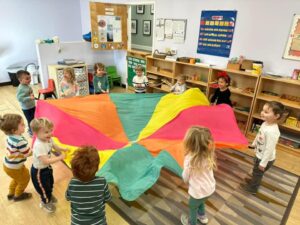More Than Just A Daycare
Our hybrid Montessori program blends traditional Montessori principles with elements of more conventional daycare or preschool methods. This approach aims to provide the best of both worlds: the child-centered, self-directed learning of Montessori alongside some structured group activities and schedules found in traditional settings.
In a hybrid Montessori, children still have the opportunity to explore and learn independently through Montessori materials and activities, fostering skills like problem-solving, independence, and critical thinking. At the same time, they may participate in group activities, such as circle time, outdoor play, or themed lessons, designed to support socialization and teamwork.
The hybrid model often includes a balance of one-on-one teacher guidance and small group instruction, ensuring that each child’s individual pace is respected while still providing some structure. This blend offers flexibility, helping children develop both independence and social skills within a supportive environment. It also allows parents who prefer a more structured routine for their child to benefit from Montessori’s personalized learning approach.

